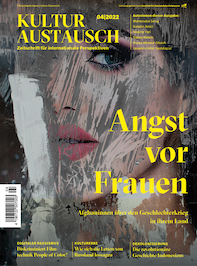When international troops withdrew from Afghanistan in August 2021, the radical Islamist terrorist militia of the Taliban seized control everywhere in the country.
Everyday life has changed since the takeover. Women in particular have their basic rights restricted in all areas of life. Therefore, only Afghan women have their say in this dossier. Many can no longer work in their professions, while girls are only allowed to go to school up to grade 6. All women are forced to wear in full body veils when they move around the city. We asked them: What are their worries? And what does their future look like?
October 2022

“It’s not just my body locked up at home; it’s also my mind”
Discover the printed issue
In addition to our country focus Afghanistan, our IV/2022 issue contained more reports, interviews and news items from around the world:
Light and Shadow. How People of Color are portrayed in film - and what technology has to do with it. With Musquiqui Chiyhing
Against white time. Writer Fatin Abbas on efficiency, productivity and community - through time
The Whale. A South Korean master novel about two women in a patriarchal society















